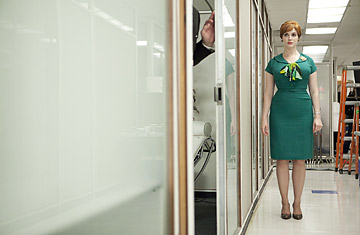
Tomorrow never knows. How Mad Men solves the problem of finding the past
It has been 17 months since the Season 4 finale of AMC's Mad Men, "Tomorrowland"--enough time that the show seems not just about another era but from another era. In October 2010, when Don Draper proposed to his secretary after a trip to Disneyland, Democrats controlled the House, Osama bin Laden was still alive, and ABC and NBC had yet to try their own early-'60s dramas, Pan Am (now on indefinite hiatus) and The Playboy Club (which has already bunny-hopped to that big grotto in the sky).
But Mad Men, which survived a rancorous contract negotiation between AMC and creator Matthew Weiner, saunters back onscreen March 25 with casual confidence, as if we'll feel it never left. Damn its cocky handsome face, it's right.
(This is a good point to talk spoilers. Though AMC sent the two-hour premiere to critics to review, Weiner is notoriously sensitive even to minor details' appearing in advance. So are some fans. If you're one of them, don't read further. Also, don't read advance reviews of anything, ever.)
Last we left advertising firm Sterling Cooper Draper Pryce, office manager Joan Harris (Christina Hendricks) had decided to keep the baby conceived with her ex-lover Roger Sterling (John Slattery). Don (Jon Hamm) had divorced wife Betty (January Jones), spiraled into chronic drunkenness and grabbed onto the comely young life raft Megan (Jessica Par). The newish firm was still cobbling together business. These stories and more have advanced, but regardless of Weiner's militant secrecy, the premiere doesn't throw wild game changers our way--because the show's philosophy is that people's games only occasionally change. (Don, for one, has been on the same quest for identity ever since he stole a dead soldier's tags during the Korean War.)
Rather than pile on new stories, Mad Men understands that most people have only one story and it just keeps going. It's an understanding the show shares with the drama where Weiner apprenticed, The Sopranos, in which antihero Tony Soprano learned little from his first walk down the driveway to his final blackout.
Finding drama in inertia is one way Mad Men has solved the problem of depicting the '60s on TV. Shows such as Pan Am and The Playboy Club hammered home the theme of change, change, change; on Mad Men, social upheaval goes on in the background, and characters register it in vague, self-interested ways. (A client representing a division of Heinz suggests tapping into the zeitgeist with "someone with a picket sign saying 'We want beans!'") Mad Men's characters are products of their time, not illustrations of it. When you see an aggressively period-designed set, it's to prove a point: that a business was set up overnight or that someone is suddenly playing house in a brand-new apartment.
On Mad Men, history is something that happens while you're living your life. The show slips up when it too blatantly confronts the times: the JFK-assassination episode in Season 3 was one of its worst, and the Season 5 premiere gets heavy-handed when civil rights protests literally land on the doorsteps of Madison Avenue. At its best, the show asks internal questions, not textbook ones. Can you let yourself be happy? Can you ever stop repeating your mistakes? Can you rebrand yourself like a can of beans?
